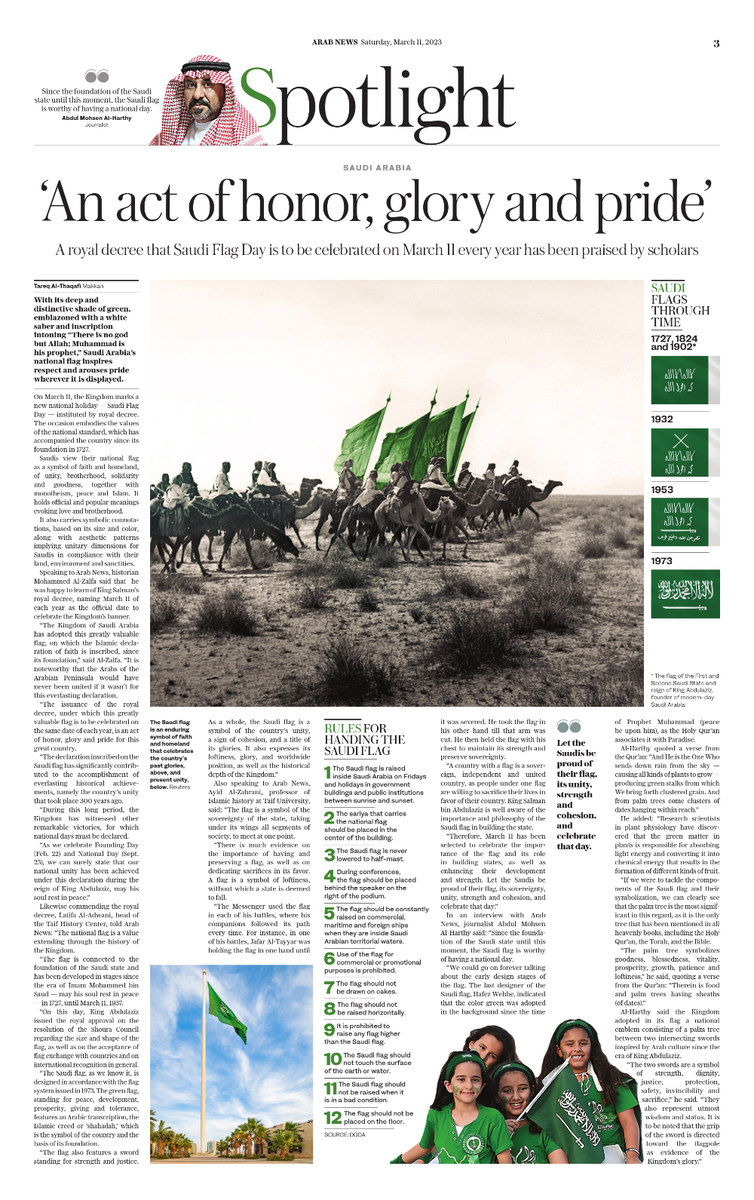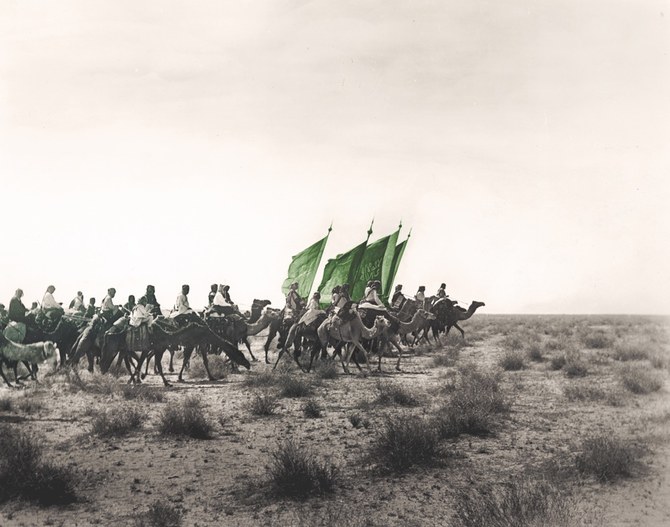MAKKAH: With its deep and distinctive shade of green, emblazoned with a white saber and inscription intoning “There is no god but Allah; Muhammad is his prophet,” Saudi Arabia’s national flag inspires respect and arouses pride wherever it is displayed.
On March 11, the Kingdom marks a new national holiday — Saudi Flag Day — instituted by royal decree. The occasion embodies the values of the national standard, which has accompanied the country since its foundation in 1727.
Saudis view their national flag as a symbol of faith and homeland, of the people, unity, brotherhood, solidarity and goodness, together with monotheism, peace and Islam. It holds official and popular meanings evoking love and brotherhood.
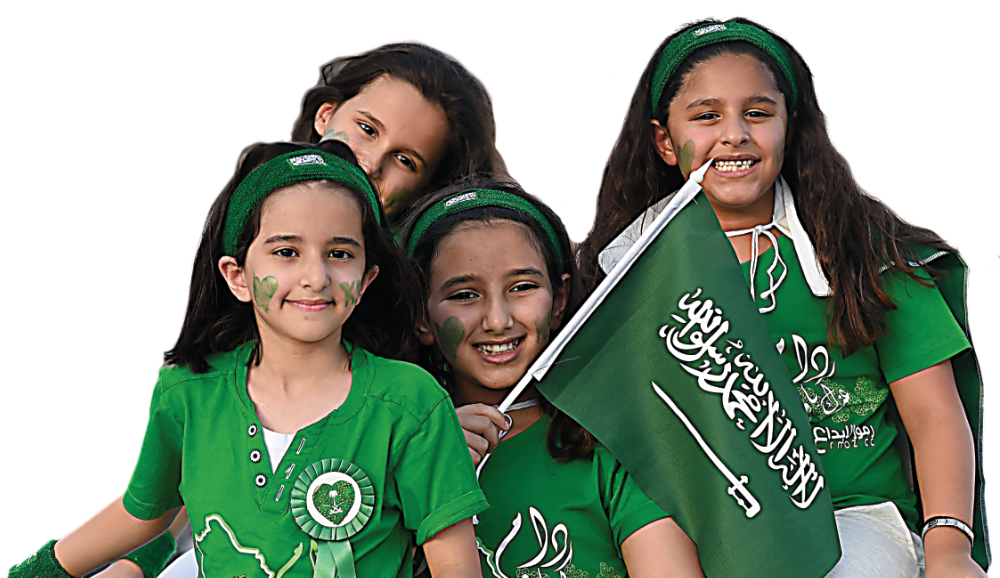
On March 11, the Kingdom marks a new national holiday — Saudi Flag Day — instituted by royal decree. (Reuters)
It also carries symbolic connotations, based on its size and color, along with aesthetic patterns implying unitary dimensions for Saudis in compliance with their land, environment and sanctities.
Speaking to Arab News, historian Dr. Mohammed Al-Zalfa says he was happy to learn of King Salman’s royal decree, naming March 11 of each year as the official date to celebrate the Kingdom’s banner.
“The Kingdom of Saudi Arabia has adopted this greatly valuable flag, on which the Islamic declaration of faith is inscribed, since its foundation,” said Al-Zalfa. “It is noteworthy that the Arabs of the Arabian Peninsula would have never been united if it wasn’t for this everlasting declaration.
“The issuance of the royal decree, under which this greatly valuable flag is to be celebrated on the same date of each year, is an act of honor, glory and pride for this great country.
“The declaration inscribed on the Saudi flag has significantly contributed to the accomplishment of everlasting historical achievements, namely the country’s unity that took place 300 years ago.
“During this long period, the Kingdom has witnessed other remarkable victories, for which national days must be declared.
“As we celebrate Founding Day (Feb. 22) and National Day (Sept. 23), we can surely state that our national unity has been achieved under this declaration during the reign of King Abdulaziz, may his soul rest in peace.”
Likewise commending the royal decree, Dr. Latifa Al-Adwani, head of the Taif History Center, told Arab News: “The national flag is a value extending through the history of the Kingdom.
“The flag is connected to the foundation of the Saudi state and has been developed in stages since the era of Imam Mohammed bin Saud — may his soul rest in peace — in 1727, until March 11, 1937.
“On this day, King Abdulaziz issued the royal approval on the resolution of the Shoura Council regarding the size and shape of the flag, as well as on the acceptance of flag exchange with countries and on international recognition in general.
“The Saudi flag, as we know it, is designed in accordance with the flag system issued in 1973. The green flag, standing for peace, development, prosperity, giving and tolerance, features an Arabic transcription, the Islamic creed or ‘shahadah,’ which is the symbol of the country and the basis of its foundation.
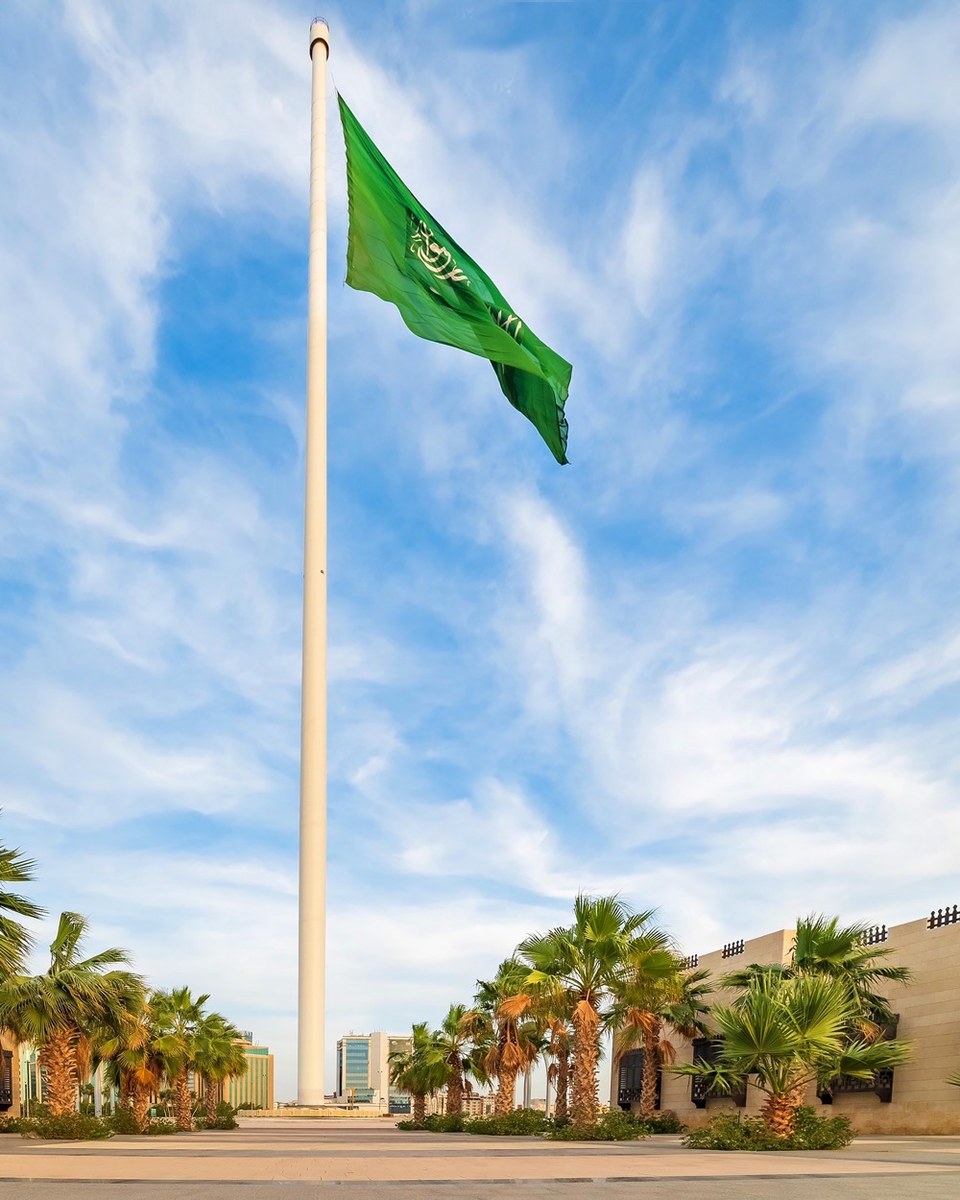
Saudis view their national flag as a symbol of faith and homeland, of the people, unity, brotherhood, solidarity and goodness, together with monotheism, peace and Islam.
“The flag also features a sword standing for strength and justice. As a whole, the Saudi flag is a symbol of the country’s unity, a sign of cohesion, and a title of its glories. It also expresses its loftiness, glory, and worldwide position, as well as the historical depth of the Kingdom.”
Also speaking to Arab News, Dr. Ayid Al-Zahrani, professor of Islamic History at Taif University, said: “The flag is a symbol of the sovereignty of the state, taking under its wings all segments of society, to meet at one point.
“There is much evidence on the importance of having and preserving a flag, as well as on dedicating sacrifices in its favor. A flag is a symbol of loftiness, without which a state is deemed to fall.
“The Messenger used the flag in each of his battles, where his companions followed its path every time. For instance, in one of his battles, Jafar Al-Tayyar was holding the flag in one hand until it was severed. He took the flag in his other hand till that arm was cut. He then held the flag with his chest to maintain its strength and preserve sovereignty.
“A country with a flag is a sovereign, independent and united country, as people under one flag are willing to sacrifice their lives in favor of their country. King Salman bin Abdulaziz is well aware of the importance and philosophy of the Saudi flag in building the state.
Rules for handling the Saudi flag
1. The Saudi flag is raised in Saudi Arabia on Fridays and holidays, in government buildings and public institutions between sunrise and sunset.
2. The sariya that carries the national flag should be placed in the center of the building.
3. The Saudi flag is never lowered to half-mast.
4. During conferences, the flag should be placed behind the speaker on the right of the podium.
5. The flag should be constantly raised on commercial, maritime and foreign ships when they are inside Saudi Arabian territorial waters.
6. The use of the flag for commercial or promotional purposes is prohibited.
7. The flag should not be drawn on cakes.
8. The flag should not be raised horizontally.
9. It is prohibited to raise any flag higher than the Saudi flag.
10. The Saudi flag should not touch the surface of the earth or water.
11. The Saudi flag should not be raised when it is in a bad condition.
12. The flag should not be placed on the floor.
(Source: Diriyah Gate Development Authority)
“Therefore, March 11 has been selected to celebrate the importance of the flag and its role in building states, as well as enhancing their development and strength. Let the Saudis be proud of their flag, its sovereignty, unity, strength and cohesion, and celebrate that day.”
In an interview with Arab News, journalist Abdul Mohsen Al-Harthy said: “Since the foundation of the Saudi state until this moment, the Saudi flag is worthy of having a national day.
“We could go on forever talking about the early design stages of the flag. The last designer of the Saudi flag, Hafez Wehbe, indicated that the color green was adopted in the background since the time of Prophet Muhammad (peace be upon him), as the Holy Qur’an associates it with Paradise.
“Green is not only the master of all colors in this context, but also a great element used in psychiatry, as it relieves the soul and the sight, while preventing depression and distress.”
He also quoted a verse from the Qur’an: “And He is the One Who sends down rain from the sky — causing all kinds of plants to grow — producing green stalks from which We bring forth clustered grain. And from palm trees come clusters of dates hanging within reach.”
He added: “Research scientists in plant physiology have discovered that the green matter in plants is responsible for absorbing light energy and converting it into chemical energy that results in the formation of different kinds of fruit.
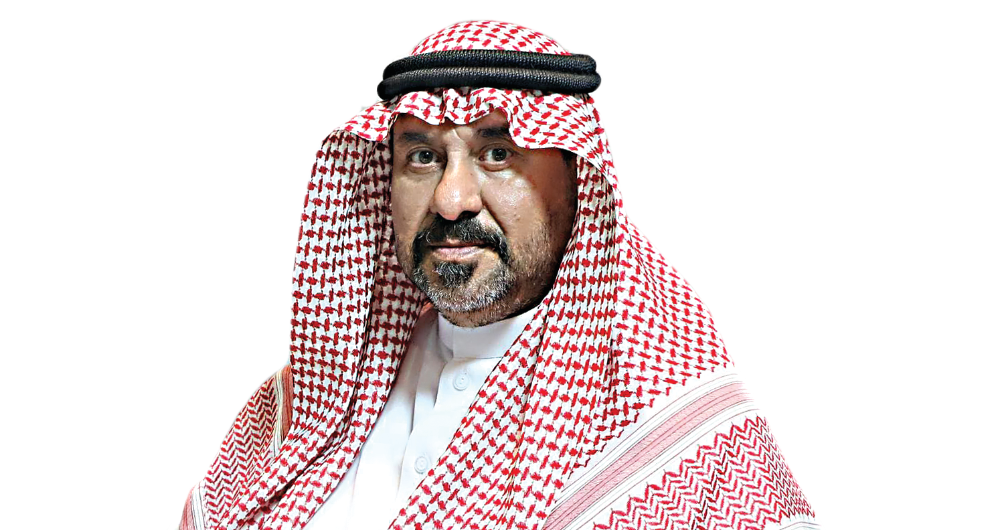
“Since the foundation of the Saudi state until this moment, the Saudi flag is worthy of having a national day,” said Abdul Mohsen Al-Harthy, a journalist.
“If we were to tackle the components of the Saudi flag and their symbolization, we can clearly see that the palm tree is the most significant in this regard, as it is the only tree that has been mentioned in all heavenly books, including the Holy Qur’an, the Torah, and the Bible.
“The palm tree symbolizes goodness, blessedness, vitality, prosperity, growth, patience and loftiness,” he said, quoting a verse from the Qur’an: “Therein is food and palm trees having sheaths (of dates).”
Al-Harthy added: “The Kingdom adopted in its flag a national emblem consisting of a palm tree between two intersecting swords inspired by the Arab culture since the era of King Abdulaziz — may his soul rest in peace — until this day.
“The two swords are a symbol of strength, dignity, justice, protection, safety, invincibility and sacrifice. They also represent utmost wisdom and status. It is to be noted that the grip of the sword is directed toward the flagpole as evidence of the Kingdom’s glory.”
